This article was first published in the Lifestyle section of the Connacht Tribune on Friday, June 14th 2019
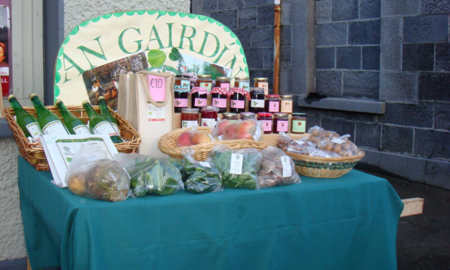
When the Mercy order of nuns allowed Noreen Lyons and three other Sisters from the Clonfert Diocese, “to follow our dream” back in 1994, they gave the green light to a project that was way ahead of its time.
The vision involved a small group of nuns – 3 teachers and a health worker – opting to live in harmony with the land and the seasons, cherishing the Earth and all its inhabitants. They developed a centre in Portumna on two-and-a half-acres of land belonging to the Mercy order, where people could live and work with nature.
“It was to rediscover our relationship to the land and the earth,” explains Noreen, a woman with a warm nature, a quiet spirituality and the air of someone who gets things done.
Their site had formerly been the garden of Portumna’s Domestic Economy School, an institute the Mercy nuns had set up in the late 1800s, to teach women crafts and agricultural skills that would help them earn their living as farmers’ wives.
The school closed down in the late 1980s after almost a century of providing this service. Its building now houses apartments, while its gardens are home to An Gáirdín Organic and Ecology Centre. It plays a vital role in Portumna, where it’s used by groups from schoolchildren to creative writers, while produce from the organic garden is sold locally.
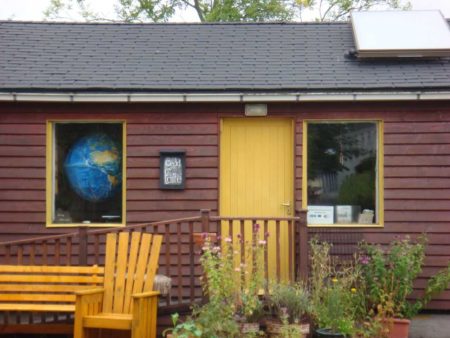 Iontas Meeting Space
Iontas Meeting Space
When Noreen and other members of the fledgling Centre ran their first organic gardening course in 1993, they struggled to find tutors who had any knowledge of organic gardening. She recalls this as she, her fellow Sister Anne Mills, gardener Des and several volunteers give the Connacht Tribune a guided tour of An Gáirdín.
That’s not a problem today, thanks in large part to their work. An Gáirdín has become a hub for educational courses including organic production, bee-keeping, cooking, composting, cosmology and more besides.
For 25 years, it has played a vital role in educating people about making choices that benefit the Earth and all its inhabitants – including human beings. This is done in a hands-on, positive way that encourages and engages people. Children, especially those from the local primary school, love coming here, foraging and enjoying a variety of teas made with herbs from the garden, says Róisín O’Brien. She and fellow volunteer Breda O’Connor help with the Schools Education Programme.
Recent warnings from the United Nations about global warming have focused on the urgent need to care for the natural world.
That’s a philosophy that has been at the heart of this place for a quarter of a century, with everyone at An Gáirdín working to combat a growing disconnect between human beings and the Earth that sustains us.
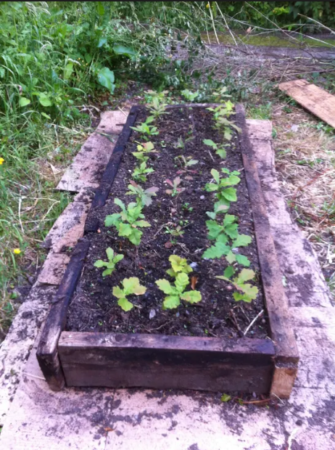
When these revolutionary nuns built their home here, on the site of an old dairy, they chose ecologically friendly materials and installed a geo-thermal heating system – only the second one in Ireland. Plants in the garden are watered using harvested rainwater. Solar panels have been installed and a meeting space, the Iontas Centre, was built using completely recycled materials. These included timber pallets from Holland and roof tiles made of recycled plastic from cars. The Iontas Centre was built over the course of a weekend in the early 2000’s, a community project involving local volunteers who learned about eco-building during the process. All the insulation in this spacious meeting area is natural and almost all the furniture has been upcycled.
The name Iontas means Wonderment and the spce is used by, among others, the local Pen Pushers creative writing group and the area’s visual arts group – Iontas serves as an art gallery during the annual Shorelines Arts Festival. A cosmology group – devoted to studying the universe and all its interconnected life – which was established in the early days of An Gáirdín, also meets here.
Noreen and fellow Sister, Anne Mills, live in the house at An Gáirdín that was built in the early 1990’s.
Noreen was there from the beginning and Anne joined nearly two decades ago, moving from Galway City where she had taught in Mervue Primary School for 14 years. Having made the decision to choose this way of life, she loved it from the beginning, she says, despite some early reservations about the hens.
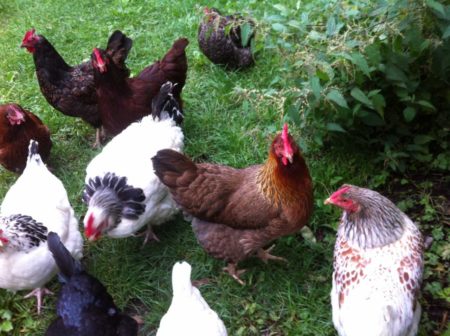
Although she’s from a rural background, Anne hadn’t grown up on a farm and wasn’t used to fowl. The rattled her. Now she’s mad about them and their organic eggs – a keen cook and baker, she treasures these daily offerings.
Nothing that’s produced at An Gáirdín is taken for granted – the care and attention to detail is obvious as we walk through the fertile space, with its mix of wild meadows, vegetable areas, polytunnels, orchards and herb beds. Pathways which were created when the nuns ran the Domestic Economy School have been incorporated into the space, with native hedgerows – including holly, rowan, spindle and hawthorn – providing shelter for wildlife.
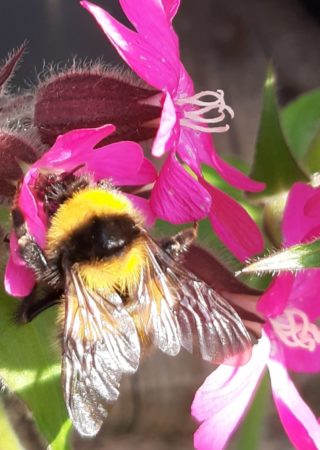
The colours and scents are awe-inspiring as the sound of birdsong and buzzing bees fills the air. Creating this idyllic space involves hard work and much of that is done by Des, the full time gardener whose knowledge of and passion for, the place is infectious. Like every gardener, he says he’s contantly learning, although when it comes to compost, he is an expert.
Its value is immense, he says, explaining that An Gáirdín’s compost heap supplied nine cubic metres of compost to the soil there last year. They operate a no-dig system, meaning the compost is put on top of the vegetable beds, leaving the worms to pull it into the ground. This method helps to suppress weeds and means the soil isn’t compressed. Des turns the compost regularly and, as he demonstrates how hot it is in the centre, he explains that compost is often used to heat water. If you have a properly run compost heap, you won’t need to buy any fertiliser, he ovserves.
The gardens here are designed in such a way that promotes diversity, with permaculture – working in harmony with nature – a driving force. A nearby field has been planted with native trees with a Dedication Grove, where people can plant a tree in honour of a loved one.
An Gáirdín has also had a tradition of involvement in the larger, global movement that campaigns for greater environmental awareness.
As far back as 1992, Noreen and her colleagues were involved in meetings to send submissions to the Rio de Janeiro Earth Summit – organised by the UN and attended by nearly 200 countries, where the Climate Change Convention was adapted.
Their local cosmology group, meanwhile, has links with similar organisations internationally and from the beginning, used distanace education to study Earth Education at Genesis Farm in New Jersey, USA. That farm, founded by Dominican nums, is “dedicated to understanding the Universe and Earth as a single, unfolding process”.
That’s also the philosphy at the core of An Gáirdín and is summed up by Noreen Lyons as we set out on out garden walk, shadowed by the resident cat, Socks. Discussing bees and nature, she spontaneously quotes lines from a poem by Gerard Manley Hopkins that sum up her beliefs:
What would the world be, once bereft
Of wet and of wildness? Let them be left,
O let them be left, wildness and wet:
Long live the weeds and the wilderness yet
For more information please contact – An Gaírdín, St. Brigids Road, Fairyhill, Portumna, Co Galway. Telephone 0909 9741689
Text by: Judy Murphy
Connacht Tribune


